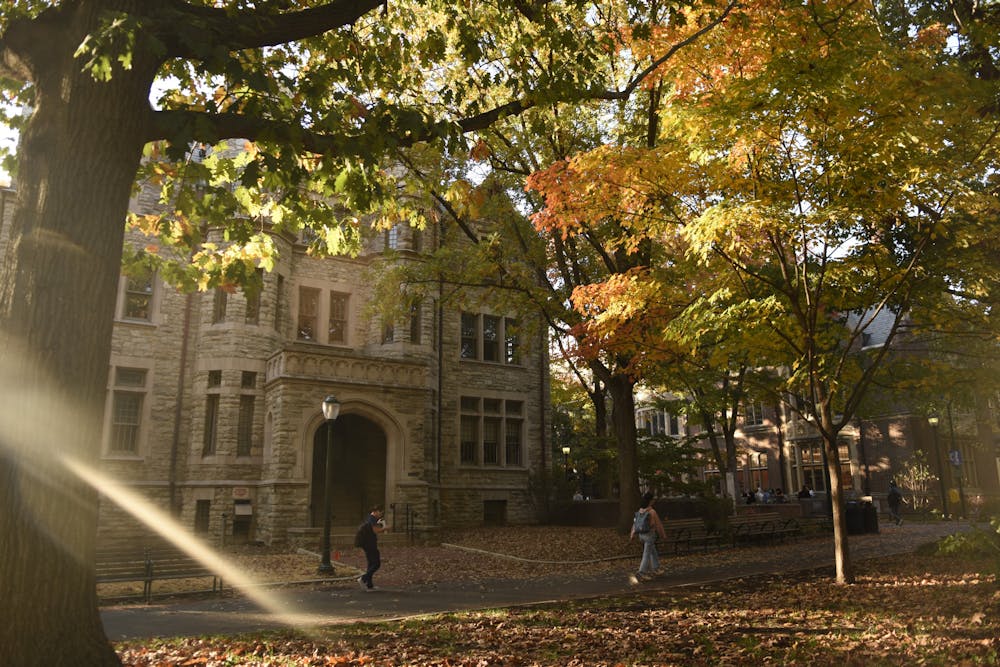
When introducing myself, I go to great lengths to point out the elephant in the room. In a way, I seek to take ownership of my background before somebody else can. Yes, I’m from Lancaster, Pa. Yes, we have the Amish. No, I am not Amish.
Most get-to-know-you conversations don’t extend beyond that singular fun fact about my hometown. But if you asked a little more, you would see that Lancaster and other small (boring!) towns offer much more than their main attractions.
The population of Lancaster County, a mere hour and a half away from Philadelphia, is just shy of 60,000. The population of University City, where Penn resides, is around 53,000. The population of my entire county is around the same size as my college town. Imagine that.
While small-town life certainly has its qualms (the limited outing options of the mall and ice cream get tiring, for one), there is a certain beauty that you can only see when you leave. Many of us small-town residents sought a big city to experience college within a new urban setting, but in our escape, we must remember to maintain the values that our homes instilled in us.
There are ways in which small-town life prepared me for college. Walking down Locust Walk and seeing seven people you know is the same as walking in downtown Lancaster and seeing eight people you went to high school with. Everyone is connected, and everyone knows each other. While we aren’t laughing at the tourists who came with the sole purpose to visit the Amish, now we can laugh at the unsuspecting tourists sitting on “Ben on the Bench.”
However, in the novelty of your views changing from open farmland to tight city blocks, it’s easy to get swept up in conforming to the values of your new community — that is, the values of an American university. Being riddled with hookup culture instead of long-term relationships, taking an Uber instead of walking three blocks when the weather drops below 50 degrees, and the general selfishness that comes with being young, dumb, and free are not things we should necessarily commit ourselves to.
Many things shocked and continue to shock me about college no matter how many times I was warned. As someone who comes from a place where everyone dates to marry and the golden age to get married is 26, observing hookup culture was nothing short of jarring. Where Lancastrian diets are a tried-and-true mix of fresh produce from the local farm stand and preservative-packed Little Debbie snacks, the campus preference of "eating sleep for dinner" and Starbucks clashed with my taste of home.
As a small-town resident protective of traditions like our Red Rose Run and Celebrate Lancaster festival, I was glad to see that Penn also values its unique traditions. However, traditions aside, Lancaster and Penn’s stark difference in cultural values continues to be unsettling. The generosity that characterizes Lancaster, where the door is always held open and a stranger would give you their shirt off their back if you were in need, is nothing compared to being on a college campus where everyone is here to fend for themselves. It isn’t a bad thing — it’s just something to keep in mind when deciding who you want to be outside of these four years at Penn.
The beauty of a college campus is that we all bring our diverse perspectives to make up a student body. We all have different values that may not align with that of the general student body at Penn. We have various definitions of success, life goals, and priorities. But in that myriad of diverse perspectives, it is essential that we remember that while where we came from doesn’t define us, it certainly contributes to who we are.
Family isn’t just those who occupy the house we return to over break. Family is the friends, the community, and the place that tethers you to your sense of self. The process of self-actualization is dependent on our interactions with others, and in our formative childhood years, the town in which we grew up in and the positive virtues they endorsed are what we should choose to take with us as we continue our lives outside of it.
While change is a core tenet of our transformative college years, it’s not everything. You can grow without compromising values that don’t align with who you are or who you want to become. Ultimately, you are who you choose to be — so don't choose to let the pressure of college turn you into somebody your family doesn't recognize. Don’t be a stranger.
TIYYA GEIGER is a College first year studying political science from Lancaster, Pa. Her email address is tiyyag@sas.upenn.edu.
The Daily Pennsylvanian is an independent, student-run newspaper. Please consider making a donation to support the coverage that shapes the University. Your generosity ensures a future of strong journalism at Penn.
Donate







